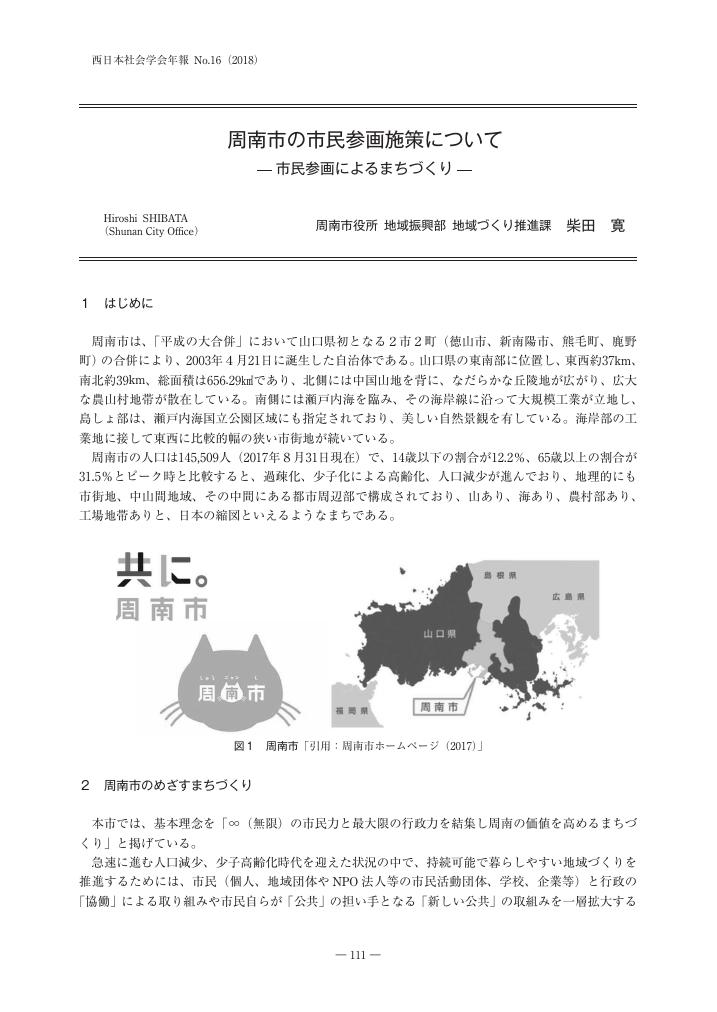- 著者
- 大畠 啓
- 出版者
- 西日本社会学会
- 雑誌
- 西日本社会学会年報 (ISSN:1348155X)
- 巻号頁・発行日
- vol.16, pp.73-84, 2018 (Released:2019-05-21)
- 参考文献数
- 37
近代社会の複雑性(Komplexität)と、それに由来する危機経験(意味と自由の喪失)を、社会進化や合理化の過程と両立させる形でいかに把握するかという問いは、マルクス主義以来社会理論にとって大きなテーマであった。この問いに応える代表的な試みの一つが、J. ハーバーマスの「システム/生活世界」図式である。この図式は彼の法治国家論の展開以降も、妥当性を保持しうるものだろうか。本稿ではこの問いについて、批判理論の危機診断的観点から考察を深めるための補助的作業として、A. ホネットとA. デミロヴィッチの「システム/生活世界」図式批判を検討した。 まとめるならば両者とも、コミュニケイションに潜む権力関係やイデオロギー性への洞察を、システムと生活世界を分離しない形で先鋭化している。「システム/生活世界」図式から離れて、コミュニケイションに歪みをもたらす複雑性や機制を、システム以外の形で幅広く捉え直す可能性を探求するためには、今後の研究課題として、社会を合理化へと導く公共圏のポテンシャルの活用を阻害する諸要因を、社会理論や法理論のみならず、メディア研究や文化分析も総合する形で解明する必要性があることを確認した。
- 著者
- 周 怡君
- 出版者
- 西日本社会学会
- 雑誌
- 西日本社会学会年報 (ISSN:1348155X)
- 巻号頁・発行日
- vol.16, pp.85-93, 2018 (Released:2019-05-21)
- 参考文献数
- 24
Improving the living conditions and quality of life for persons with disabilities (PWDs) are crucial aspects guiding disability policies in several countries. From the Americans with Disabilities Act (ADA) (1990) to the United Nations Convention on the Rights for Persons with Disabilities (CRPD) (2006), the importance of a rights-based approach to disability policy may be regarded as the most frequently mentioned resolution of the last two decades. The nations participating in the CRPD are required to enforce the content of the convention. However, disability policies have long been seen as an important part of welfare state policies, the characteristics and construction of which are deeply influenced by the financial resources and payment structures of individual countries. Sheltered workshop policies for PWDs are no exception, although these policies do share some similar characteristics across countries, such as a facilities-based working plan and low wages. Thus, it is worth studying how the core values and policy practices identified by the CRPD-such as integration, nondiscrimination, and decision-making with the participation of PWDs-influence the sheltered workshop policies of individual welfare state countries. This article examines the impact of the CRPD on the sheltered workshop policies regarding PWDs in three welfare state nations. Notably, the welfare policy framework and resource allocation patterns of each country affect its sheltered workshop policies more than does their signing the CRPD.
1 0 0 0 OA 在宅ホスピスケアにおけるボランティア活動の諸相 ―インタビュー調査のデータ分析から―
- 著者
- 孔 英珠
- 出版者
- 西日本社会学会
- 雑誌
- 西日本社会学会年報 (ISSN:1348155X)
- 巻号頁・発行日
- vol.16, pp.95-110, 2018 (Released:2019-05-21)
- 参考文献数
- 13
本稿では、在宅ホスピスボランティアの会「A」のボランティア11人から得られた在宅訪問活動における14の事例を検討し、在宅訪問活動の諸相を提示した上で、活動対象者のニーズと在宅ホスピスボランティアの役割について考察を行った。 「A」は、終末期の患者・家族のみならず、神経難病の患者・家族や要介護高齢者・家族も活動の対象者とし、見守りや談話・交流、個別ニーズへの対応、家族に対する支援を行っていた。これらの活動は、在宅医療やホスピスケアを推進しようとする医療福祉機関との連携の中で行われていた。とりわけ医療ソーシャルワーカーが「A」と患者・家族の間でマネジメント役を果たしていることは、ボランティアや患者・家族の双方に安心感を与え、在宅訪問活動がスムーズに行われるための重要な要素となっていた。「A」の在宅訪問活動の事例から、患者・家族には公的サービスや市場では賄いきれない情緒的ニーズ・日常生活支援ニーズがあることが推察され、在宅訪問活動はそのようなニーズへの充足に有効である可能性がうかがわれた。なお、在宅ホスピスボランティアの役割については「患者・家族の全人的苦痛やニーズに寄り添いながら、生活者同士として患者・家族とふれ合う存在である」とまとめることができた。
1 0 0 0 OA 周南市の市民参画施策について ―市民参画によるまちづくり―
- 著者
- 柴田 寛
- 出版者
- 西日本社会学会
- 雑誌
- 西日本社会学会年報 (ISSN:1348155X)
- 巻号頁・発行日
- vol.16, pp.111-117, 2018 (Released:2019-05-21)
1 0 0 0 OA 「九州つなぎ隊」による過疎・災害・高齢化問題に対する支援活動
- 著者
- 初鹿野 聡
- 出版者
- 西日本社会学会
- 雑誌
- 西日本社会学会年報 (ISSN:1348155X)
- 巻号頁・発行日
- vol.16, pp.119-124, 2018 (Released:2019-05-21)
- 著者
- 速水 聖子
- 出版者
- 西日本社会学会
- 雑誌
- 西日本社会学会年報 (ISSN:1348155X)
- 巻号頁・発行日
- vol.16, pp.125-126, 2018 (Released:2019-05-21)
- 著者
- 徳永 勇
- 出版者
- 西日本社会学会
- 雑誌
- 西日本社会学会年報 (ISSN:1348155X)
- 巻号頁・発行日
- vol.16, pp.127-128, 2018 (Released:2019-05-21)
- 著者
- 西村 雄郎
- 出版者
- 西日本社会学会
- 雑誌
- 西日本社会学会年報 (ISSN:1348155X)
- 巻号頁・発行日
- vol.16, pp.129-130, 2018 (Released:2019-05-21)
1 0 0 0 OA 特集解題
- 著者
- 堤 圭史郎
- 出版者
- 西日本社会学会
- 雑誌
- 西日本社会学会年報 (ISSN:1348155X)
- 巻号頁・発行日
- vol.16, pp.1-3, 2018 (Released:2019-05-21)
1 0 0 0 OA 熊本地震における車中避難の選択理由と生活上の困難
- 著者
- 稲月 正
- 出版者
- 西日本社会学会
- 雑誌
- 西日本社会学会年報 (ISSN:1348155X)
- 巻号頁・発行日
- vol.16, pp.5-22, 2018 (Released:2019-05-21)
- 参考文献数
- 1
- 被引用文献数
- 2
熊本地震での車中避難者への調査データをもとに「どのような人が、なぜ車中避難を選択したのか」「車中避難者はどのような困難に直面していたか」について分析した。その結果、以下のことが示された。 ① 調査対象となった車中避難者の約3割は60歳以上であり、約2割は単身者であった。また、3割以上が震災前の世帯メンバーと別れた形で車中避難生活を送っていた。 ② 車中避難を選択した理由は「余震への不安」「自宅の損傷」「避難所の問題」に大別された。ただし「避難所の問題」は、さらに「人が多く落ち着かない」と「社会的弱者の排除」に分けられた。 ③ KH Coder を用いた計量テキスト分析からは、車中避難の選択理由として「混雑の回避」「社会的弱者の排除」「余震への恐怖」「自宅からの近さ」の4つが析出された。 ④ 車中避難生活での困りごととして「心身の健康」「トイレなどの衛生環境」「将来への不安」「相談体制の不備」があげられた。なお、トイレについては女性の方が明らかに困っていた。また、自宅の損壊が激しい人ほど将来に不安を抱いており、必要な情報が届いていないと感じていた。 最後に、これらの結果をもとに車中避難者支援の方向性を6項目にまとめた。
1 0 0 0 OA 西原村における被災と対応の個別性 ―地域社会レベルと時間の経過を軸に―
- 著者
- 藤本 延啓
- 出版者
- 西日本社会学会
- 雑誌
- 西日本社会学会年報 (ISSN:1348155X)
- 巻号頁・発行日
- vol.16, pp.23-33, 2018 (Released:2019-05-21)
- 参考文献数
- 7
- 被引用文献数
- 1
熊本県阿蘇郡西原村は、2016年の熊本地震において甚大な被害を受けた。本稿は、被災者における被災と対応について、西原村の地域社会空間が持つ特性、および災害発生からの時間の経過に着目しながら、西原村における複数の事例を分析していく。 まずは、災害の初動・応急期対応において、相対的にミクロな地域社会空間では構造的な「強み」が、マクロレベルでは構造的な「弱み」が存在すること、また、時間が経過していくほどに被災と対応の「個別性」が深化・拡大していくことが確認できる。 さらに、この個別性の深化・拡大は、時間が経つほどにミクロレベルにも「弱み」の構造があらわれていくことや、被災者の抱える課題が「みえない」状態に落とし込まれていくことへつながっていることが明らかになる。 これらをふまえ、災害対応・支援への社会学(者)によるアプローチの可能性を考えるならば、被災者の個別性を、対応・支援の枠組みとなる相対的にマクロなレベルにリンクさせること、そのために「みえない諸課題」を「みえる」ようにするための丁寧な調査と分析が、その一端となるであろうことを指摘できる。
1 0 0 0 OA 日常と非日常のはざまで ―由布院温泉にみる震災対応と復興―
- 著者
- 米田 誠司
- 出版者
- 西日本社会学会
- 雑誌
- 西日本社会学会年報 (ISSN:1348155X)
- 巻号頁・発行日
- vol.16, pp.35-42, 2018 (Released:2019-05-21)
- 参考文献数
- 2
人はなぜ旅をするのか。この問いから始まる観光について、日常は非日常と背理的あるいは相対的に概念づけられるものの、地域ごとに異なる日常があり、観光客、観光地に暮らす人々にも日常と非日常があることをまず指摘した。その上で、観光地で災害が発生した場合にどのようなことが起きるのかについて、2016年4月に発生した熊本地震からの復旧と復興について、由布院温泉で検証した。その結果、地震発生により日常と非日常のはざまは一瞬で消失し、住民も観光客も等しく被災者となる中、復旧、復興の活動が行われた。復旧では人材や資材の不足により不便な生活や営業を強いられながら復旧工事を待った一方で、同年7月から実施されたふっこう割施策の効果は大きく、2016年7月から9月の第1期でほぼ例年並みに戻ることができた。詳細には、宿泊業の客数がこの期間まず回復し、その後他業種も客数が回復していった。またマスコミの過剰報道による風評被害が指摘される一方で、九州各地から支援に足を運ぶことが評価されていた。最後に、観光地を抱える地域の防災計画策定では、定住人口だけでなく非定常人口も考慮に入れた防災計画策定を検討すべきであろう。






